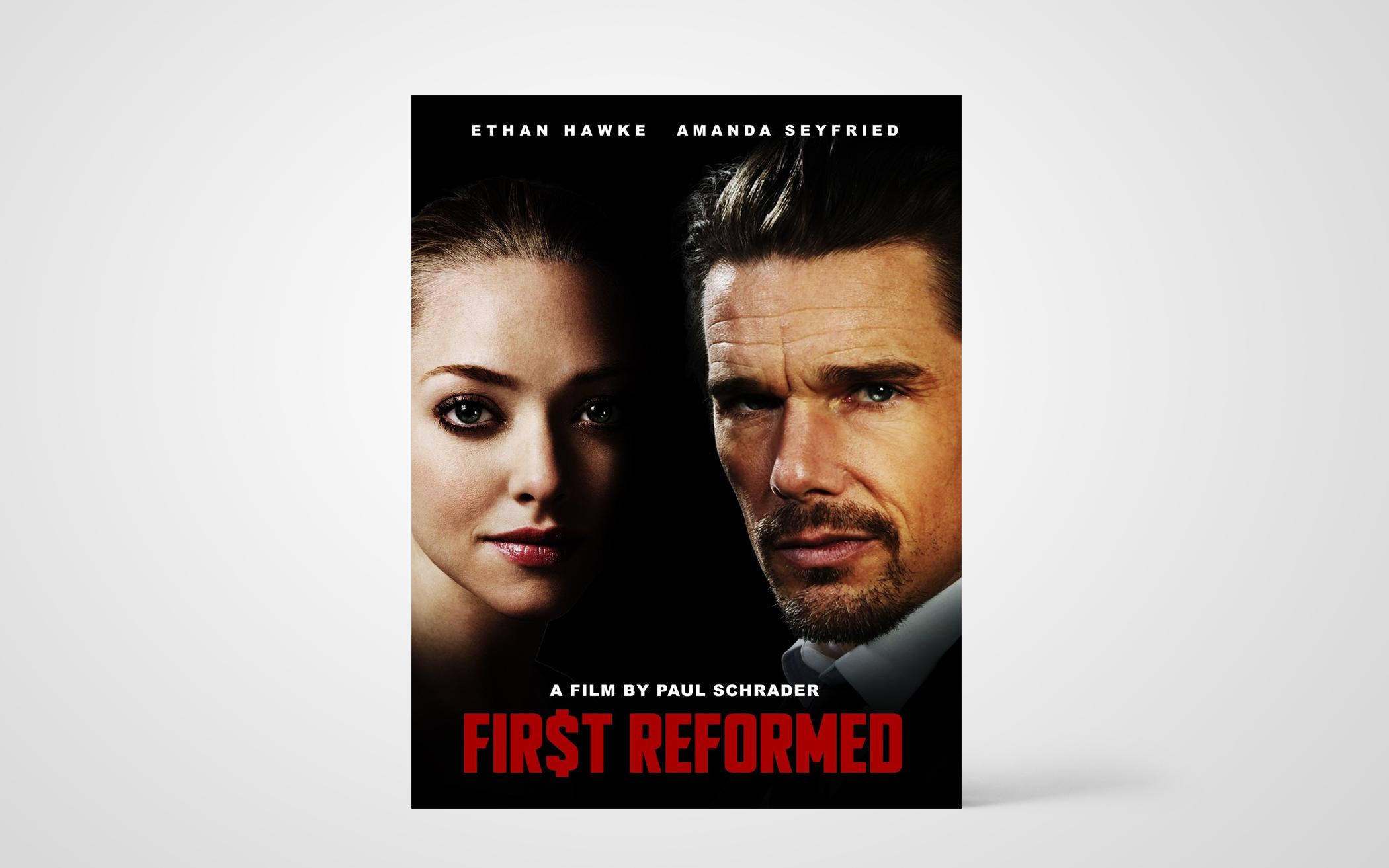Ernst Toller (Ethan Hawke) serves dutifully as the pastor at First Reformed, a historic church in upstate New York that attracts only a dozen people. In an opening scene, Toller leads a service by asking the few congregants what their “only comfort in life and death” is.
The search for comfort is indeed the film’s focus. We soon learn that Toller, a retired military chaplain, had convinced his son to enlist. But the son died in action and Toller’s wife left him soon afterward. How can Toller find meaning in his life? In addition to his grief, he is clearly sick and drinks too much. Toller tries unsuccessfully to process his problems through late-night journal entries.
Toller’s work offers few consolations. He is supervised by Pastor Jeffers (Cedric “the Entertainer” Kyles), the leader of Abundant Life, a nearby megachurch. Jeffers doubts Toller’s ability to (1) organize the upcoming 250-year rededication of First Reformed, (2) keep local industrialist and major donor Edward Balq (Michael Gaston) happy, and (3) take care of himself. In that order.
In this sad and stressful context, Toller jumps at the opportunity to do some true pastoral work on behalf of Mary (Amanda Seyfried), a pregnant parishioner who asks him to counsel her husband Michael (Philip Ettinger). A radical environmentalist, Michael sees no hope in life and wonders whether Mary should even give birth to their child. Through this contact, Toller finds a new direction and a startling “new form of prayer.”
Critics who have seenFirst Reformed at film festivals and advance screenings have been overwhelmingly positive in publications ranging from The New Yorker (“a fierce film”) to Christianity Today (“a stunning dark night of the soul”).
While these accolades and the general plotline might be appealing, the film will definitely not be to everyone’s taste. Unprepared, you may even leave the theater fiercely disappointed and stunningly depressed.
After graduating from Calvin College in 1968, Paul Schrader left Grand Rapids to study film at UCLA and wrote a master’s thesis published in 1972 as the highly regarded Transcendental Style in Film: Ozu, Bresson, Dreyer. Schrader went on to be a film critic, the screenwriter for Martin Scorcese’s Taxi Driver and Raging Bull, and the director of his own films, including Blue Collar, American Gigolo, and Affliction. Quite a career for someone who wasn’t allowed to go to the movies as a kid.
At a screening of First Reformed in Grand Rapids and during a subsequent lecture/panel discussion held at Calvin College, Schrader explained how most commercial films use various techniques to guide, if not manipulate, the viewer’s emotions. For example, if a character is happy, the soundtrack will be happy. If conflict occurs, the music will be moody.
By contrast, in the transcendental style, a director will use “withholding techniques.” Often, the camera will remain fixed on a particular scene, with moments of dead time when a character leaves a room. The only music you hear may be the sound of a car radio playing or a church choir that is actually singing in a scene.
The goal of such withholding techniques, Schrader explained, is to get the viewer to “lean in”—to try to figure out independently what is going on in a character’s life. The payoff occurs when the director pulls out some stops to bring the character—and the viewer—to a transcendent moment, to a spiritual experience. In short, a film in the transcendental style pulls the emotion from you instead of just giving it to you.
While this all may seem terribly intellectual, First Reformed is first of all a work of art, beautifully filmed and acted. Ethan Hawke gives a particularly engaging performance as Toller, and Cedric Kyles does excellent work as the compassionate yet compromised megachurch pastor. The female leads, however, seem secondary (Seyfried’s Mary), and even jarringly unappreciated (Victoria Hill as Esther). While other critics have found some final dreamlike scenes engaging, Schrader did not convince me completely by his decisions to, well, withhold no more. I will not give any details and let you judge the role of such scenes in a very well-crafted film.
To understand First Reformed and its style fully, I recommend watching the works Schrader has claimed as the inspiration for this film: Robert Bresson’s Diary of a Country Priest (1951), Ingmar Bergman’s Winter Light (1963), Andrei Tarkovsky’s The Sacrifice (1986), and Pawel Pawlikowski’s Ida (2014) (all available through Netflix’s DVD service).
For bonus points, watch Taxi Driver (1976) to see how Schrader’s troubling Travis Bickle (Robert De Niro) is not so different from Pastor Toller. Also look for signs of the transcendental style in Schrader’s earlier films such as American Gigolo (1980) and Light Sleeper (1992). [Editor’s note: Viewers’ discretion is advised for many of Schrader’s films.]
And if you really want to lean in, order a copy of Schrader’sTranscendental Style in Film, reissued this month by the University of California Press. (A24 Films)
About the Author
Otto Selles teaches French at Calvin College, Grand Rapids, Mich., and attends Neland Avenue Christian Reformed Church in Grand Rapids.








